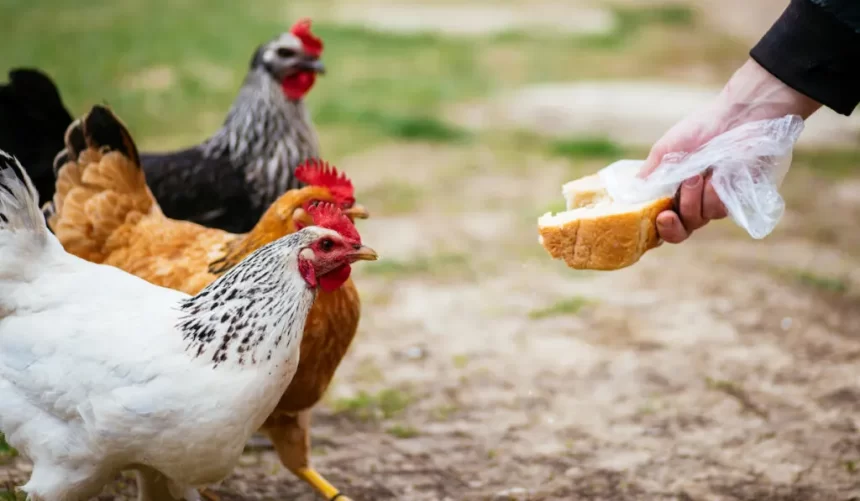As I care for my small backyard flock of chickens, questions about their diet often arise. I want to make sure I’m feeding them properly to keep them healthy and happy. One question I found myself asking is: can chickens eat cheese?
I wasn’t sure, so I decided to do some research to find the answer. As a chicken owner, I know it’s important to understand what is and isn’t safe for chickens to eat. After looking into it further, I discovered some valuable information that I want to share.
In this definitive guide, I will cover everything you need to know as a chicken owner about whether chickens can or should eat cheese
Can Chickens Have Cheese?
The short answer is yes, chickens can eat some types of cheese in moderation.
Most chickens love cheese and it can be a good source of extra protein and calcium. However, not all cheeses are created equal when it comes to chickens. Some are perfectly healthy, while others carry risks.
The key is to only choose and offer natural cheeses in small quantities occasionally as a supplemental treat. Cheese should never make up a large part of a chicken’s diet.
Below I’ll explain in more detail how their digestive systems can handle cheese and important caveats to keep in mind.
Why Chickens Can Digest Some Cheese
To understand why cheese, in moderation, is okay for chickens, we first have to understand a bit about their digestive systems.
Chickens have a short, relatively simple gastrointestinal tract compared to many mammals. Food passes through quickly, which is why chickens poop so often!
They don’t have teeth to chew food. Instead, they swallow small pieces whole or crush them briefly in their gizzards before rapidly absorbing nutrients.
Given their short, fast-acting digestive system that can’t thoroughly break down complex foods, chickens can only safely eat certain types of dairy products. Hard aged cheeses are the easiest for them to digest.
The aging process pre-digests the proteins and fats, making cheddar, parmesan, Swiss and similar hard cheeses easier on their systems. Softer fresh cheeses and dairy like milk or cream are too rich and will upset their stomachs.
Now that we know why some cheeses digest better than others, let’s look closer at the nutritional value cheese may add to their diet.
Nutrition Content of Cheese for Chickens
The main nutrients cheese contains that can benefit chickens are:
- Protein – essential for growth, egg and feather production
- Calcium – needed for strong eggshells and bones
- Fat – provides concentrated energy
- Vitamin A – important for reproduction, immunity, vision
Cheese is high in calories and fat compared to other foods. In small amounts, the extra fat and energy can help boost chickens during high energy needs like molting or egg production. However, too much can also increase obesity and liver problems.
The extra protein is useful for growing, pregnant or laying hens but unnecessary if they already get plenty from their feed. The calcium content varies based on the type but can compliment their dietary calcium needs nicely.
Some aged cheeses also provide a small amount vitamin A benefit. Overall, a little bit of cheese can provide valuable nutrients chickens need. But that doesn’t mean all cheeses are safe or healthy to share with backyard chickens.
Risks of Feeding Chickens Cheese
While an occasional cheese treat seems innocent enough, there are some notable risks to be aware of:
- Weight gain – too much fat without exercise causes obesity
- Digestive upset – chickens can’t digest some soft cheeses properly
- Lactose intolerance – chickens don’t produce “lactase” to digest lactose sugars
- Too much protein – strains kidneys if overloaded with protein
- Sodium content – some cheeses are very high in salt
Obesity is one of the most common and detrimental health issues backyard chickens face from too many treats. Their small size hides added weight gain we might readily notice on a larger pet.
Irregular loose droppings signal digestive upset from their system trying to pass food it couldn’t properly digest. Some chickens also appear to be lactose intolerant, likely because they naturally stop producing lactase enzymes once mature.
Excess protein stresses the kidney filtration system that isn’t designed to handle a high protein diet over an extended period.
Finally, some aged cheeses like parmesan or feta contain very high sodium levels. Too much salt is unhealthy over time leading to issues like dehydration or heart disease. Baby chicks under 4 weeks old are especially sensitive to sodium levels.
As you can see, a variety of concerning health issues could result if chickens regularly consume cheese, especially in larger quantities. The risks depend greatly on the type and amount of cheese offered.
What Type of Cheese Can Chickens Eat?
Not all cheeses are suitable for chickens. In general, harder aged cheeses are safer while soft unaged cheeses should be avoided. Here’s a breakdown of the best and worst types to offer as an occasional treat:
- Aged Cheddar: The most popular choice – provides protein, calcium and vitamin A without lactose sugars. Avoid excess salt.
- Swiss: Also safe and nutritious in small amounts – offers similar benefit to aged cheddar.
- Parmesan (use sparingly): While packed with protein and calcium, it’s very high in salt content. Use prudently.
- Mozzarella, Provolone (occasionally): These semi-soft cheeses are somewhat harder to digest but okay as a rare snack.
- Blue Cheese (not recommended): Too moldy and strong flavored for most chickens plus challenging to digest.
- Brie and Camembert (avoid): Creamy soft cheeses will upset digestion.
- Goat Cheese (avoid): Another very rich soft cheese that chickens can’t properly digest.
- Processed Cheese Slices (never): Artificial flavors, colors and preservatives have no place in a chicken’s diet.
Of course, this list isn’t necessarily all-inclusive. As a general rule, stick with small amounts of harder, aged natural cheeses. Avoid soft, fresh cheeses as well as any with artificial additives.
Also, skip crumbled blue cheese. Not only is it potentially harder to pass through their system, many chickens seem put off by strong moldy flavors.
When first sharing a new cheese type, only offer a tiny piece to one chicken. Monitor them for a day or two before gradually offering more to ensure no digestive upset.
What About Feed With Cheese In It?
In addition to cheese you directly give them, some commercial feed products contain cheese powder or morsels as an added protein source. This can include:
- Layer feed blends with added cheese powder
- Mealworm treats coated in cheese powder
- Whole dried cheese curds or morsels mixed into feed
In these products, the cheese is finely powdered or processed in bite-size pieces chickens swallow easily. Because it’s incorporated into balanced feed in limited amounts, risks are low.
However, as with treats, fat and salt content varies greatly across brands and formulas. If buying feed containing cheese, read labels carefully and select reputable products.
Homemade feed that includes excess cheese scraps could pose higher risk depending on proportions and amounts eaten. Stick with limited cheese extras mixed into commercial feed for safety.
How Much Cheese Can Chickens Eat?
When it comes to cheese for chickens, moderation is key. Just because they enjoy it doesn’t mean cheese should become a dietary staple.
At most, restrict cheese treats for chickens to once or twice weekly. The total weekly amount offered depends on the cheese type and chicken size:
Hard aged cheddar
- Large fowl (Leghorn) – 1 ounce max per week
- Bantam breed – 1/2 ounce max per week
Parmesan (sparingly)
- Large fowl – 1 teaspoon max per week
- Bantam breed – 1/2 teaspoon max per week
Semi-soft cheese
- Large fowl – occasional tiny piece
- Bantam breed – do not recommend
Monitor treat intake based on your chicken’s health and weight. Obese or overweight birds should avoid cheese due to the fat content. Adjust amounts down if loose droppings occur. Check salt levels on cheese packaging and limit intake appropriately.
Provide cheese in moderation along with variety of other snacks like greens, vegetables or fruits. Free-feeding large amounts of cheese alone or in homemade feed mixtures is never a good idea. This prevents overconsumption and potential health issues.
Monitor for common signs of ill health possibly related to diet. Symptoms requiring prompt evaluation include:
- Loose foul-smelling droppings
- Decreased appetite or egg production
- Weight loss or bloating appearance
- Lethargy or increased thirst
Catching health changes early allows potential dietary adjustments if cheese or other treats happen to be the cause.
Healthier Alternatives to Cheese for Chickens
While the occasional small cheese treat is fine, chickens don’t require it for good nutrition. There are many other healthier, safer options to offer instead including:
- Chopped hardboiled eggs
- Small amounts of plain yogurt
- Cooked oatmeal
- Chopped greens
- Squash or pumpkin
- Mealworms
- Chopped fruits
- Seeds or nuts
These alternatives provide balanced nutrition from natural sources chickens are better adapted to digest safely.
Rotate different healthy snacks to add variety alongside their layer feed. Monitor treat amounts given to prevent obesity. Weigh risks and benefits if considering feeding cheese to chickens in your flock.
Pros and Cons of Feeding Cheese to Chickens
| Pros | Cons |
|---|---|
| Provides extra protein for growth and egg production | High in fat which can lead to obesity |
| Good source of calcium for strong eggshells | Some chickens are lactose intolerant |
| Extra energy and calories helpful during high demand times like molting | Excess calcium stresses kidneys if overfed |
| Chickens enjoy the taste as an occasional treat | Too much protein taxes the filtration system |
| Hard aged cheeses are easier to digest | Soft fresh cheeses upset digestive system |
| Small amounts beneficial for certain nutrients chickens need | Can cause loose foul-smelling droppings |
| Certain cheeses provide some extra vitamin A | Salt content too high in some cheeses |
| Can complement commercial feed nutrition profiles | Decreased appetite or egg production |
| Commerical feeds with cheese can be healthy if properly formulated | Weight gain or bloating appearance |
| Lethargy or increased thirst |
FAQs
No, do not feed cheese to baby chicks under 4 weeks old. Their digestive system is too delicate to handle rich foods like cheese properly. Wait until fully feathered and 8 weeks old.
In moderation, yes it provides extra protein. However, too much stresses internal organs. Their feed should provide sufficient protein without excess cheese.
Soft fresh cheeses are difficult for a chicken to fully break down and digest. This can lead to diarrhea, intestinal upset or food passing through without nutritional absorption.
Limit cheese treats for adult chickens to tiny piece about the size of a large raisin once or twice per week at most. Overfeeding cheese causes obesity and other health issues.
Yes, feeding chickens excessive amounts of cheese can contribute to obesity, digestive upset, diarrhea, kidney problems, salt toxicity and other issues. Moderation is key.
In general this is not recommended, however limited amounts of cheese powder added to commercial feed by reputable manufacturers is safer than doing this yourself.
While chickens can safely eat some foods people eat, many are harmful or provide little nutritional value. Stick with approved treats in moderation, not household scraps.
The Bottom Line: Yes, in Moderation
Can backyard chickens eat cheese?
Yes, chickens can safely eat some cheeses but ONLY in strict moderation. Aged cheddar, parmesan, Swiss or provolone cheeses are better options but still given sparingly. Offer very small piece about once a week at most.
Avoid soft, creamy cheeses as well as blue cheese and cheese foods with artificial additives. Free-feeding large amounts of cheese or cheese-filled feed carries health risks including obesity and digestive upset.
Provide cheese only occasionally as a supplement, not a dietary staple. Monitor for adverse reactions and adjust your chicken’s diet accordingly. Consider alternative healthier snacks before choosing cheese.
I hope this guide covered all your questions about whether chickens can or should eat cheese! As a fellow chicken owner and cheese lover myself, I wanted to share everything I’ve researched on the subject. Let me know if you have any other chicken diet questions! I’m always happy to help and chat chickens with a reader.





I am really loving the theme/design of your site. Do you ever
run into any browser compatibility problems? A small number of
my blog readers have complained about my site not working correctly in Explorer but looks great in Chrome.
Do you have any advice to help fix this issue?